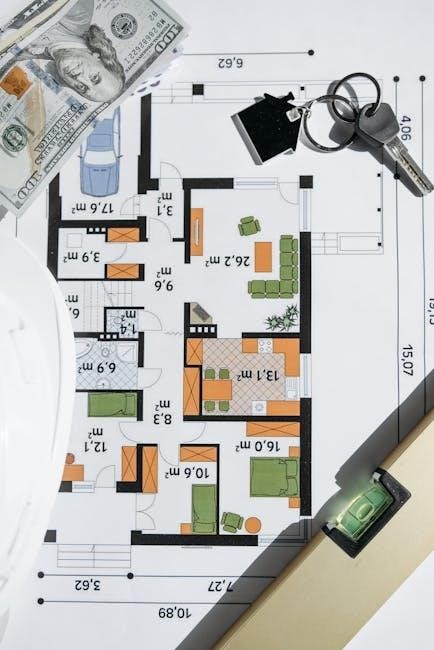Welcome to the Home Buyer’s Guide, your comprehensive resource for navigating the real estate market. From planning to closing, this guide covers every step, ensuring a smooth journey. With expert tips, insights, and tools, it helps you make informed decisions, whether you’re a first-time buyer or relocating. Discover how to streamline your search, secure financing, and find your dream home with confidence.
Understanding the Importance of a Buyer’s Guide in Real Estate
A buyer’s guide is an essential tool for navigating the complex world of real estate. It provides clarity on the home-buying process, helping buyers make informed decisions. By outlining key steps, from budgeting to closing, it ensures buyers are prepared for every stage. A guide also educates buyers on market trends, financing options, and legal requirements, reducing stress and potential pitfalls. Ultimately, it empowers buyers to approach their journey with confidence, ensuring a smooth and successful experience in achieving homeownership.
Key Steps in the Home Buying Process
Buying a home involves a series of structured steps to ensure a smooth journey. It begins with planning and budgeting, where buyers assess their financial readiness and set realistic goals. Next, getting pre-approved for a mortgage provides clarity on purchasing power. The home search follows, where buyers identify their needs and explore neighborhoods. Making a competitive offer and negotiating terms are critical steps. Finally, inspections and closing the deal ensure the process concludes successfully. Understanding these steps helps buyers navigate the market with confidence and clarity.

Planning and Budgeting
Planning and budgeting are foundational steps in the home-buying process. Assessing financial readiness, setting a realistic budget, and understanding costs beyond the purchase price are essential for success. Tools like mortgage calculators and budgeting apps can help buyers manage expenses effectively, ensuring they are prepared for both upfront and long-term financial commitments. This step lays the groundwork for a smooth and stress-free journey to homeownership.
Determining Your Budget and Financial Readiness
Determining your budget and financial readiness is the first step in the home-buying process. Start by assessing your income, savings, and debt to understand how much you can comfortably afford. Consider not only the purchase price but also ongoing costs like taxes, insurance, and maintenance. Your credit score plays a significant role in securing favorable mortgage terms. Aim for a pre-approval to get a clear picture of your spending power. Additionally, explore payment options and down payment strategies to align with your financial goals. This step ensures you’re financially prepared for homeownership;
Getting Pre-Approved for a Mortgage
Getting pre-approved for a mortgage is a critical step in the home-buying process. It involves contacting a lender to review your financial history, credit score, and income to determine how much they are willing to lend you. This step provides clarity on your budget and strengthens your position as a buyer. A pre-approval letter also helps you negotiate more effectively and demonstrates to sellers that you’re serious and financially prepared. Understanding your mortgage options and terms early on ensures a smoother transaction and avoids last-minute complications.
Understanding Credit Scores and Their Impact
Your credit score plays a pivotal role in securing a mortgage and determining the interest rate you’ll qualify for. A higher score typically leads to better loan terms and lower monthly payments. Factors like payment history, debt levels, and credit age influence your score. Monitoring and improving your credit score before applying for a mortgage can significantly enhance your financial position. A good credit score not only increases your chances of approval but also empowers you to negotiate more favorable terms with lenders.

Home Search and Selection
Define your priorities, research neighborhoods, and evaluate properties to find your ideal home. Work with agents to streamline your search and make informed decisions efficiently.
Identifying Your Needs and Wants in a Home
When identifying your needs and wants in a home, prioritize essential features like location, size, and amenities; A modern kitchen or backyard may be essential for some, while others value proximity to schools or public transport. Assess your lifestyle and future goals to distinguish between must-haves and nice-to-have features. Creating a clear list helps narrow down options and ensures your home aligns with your priorities and budget.
Researching Neighborhoods and Communities
Researching neighborhoods and communities is crucial for finding the right home. Consider factors like safety, schools, amenities, and commute times. Visit areas at different times to gauge noise levels and community vibe. Online tools like Zillow provide insights into local trends and demographics. Additionally, engage with locals to understand the area’s pros and cons. This due diligence ensures the neighborhood aligns with your lifestyle and long-term goals, making your home purchase a lasting success.

Making an Offer and Negotiation
Understanding contingency clauses and negotiation strategies is key to securing your dream home. Work with a trusted agent to craft competitive offers and navigate smooth transactions, ensuring success.

How to Make a Competitive Offer
To make a competitive offer, start by understanding the market value of the property. Ensure you’re pre-approved for a mortgage and ready to act quickly. Consider including contingency clauses like inspections or appraisals to protect yourself. Work closely with your real estate agent to craft an offer that balances your budget and the seller’s expectations. Be prepared to negotiate and stay flexible. Including a personal letter or earnest money can also strengthen your proposal. Timing and professionalism are key to securing your dream home.
Strategies for Negotiating the Best Deal
Negotiation is a critical part of the home-buying process. Start by understanding the market value of the property to make informed offers. Consider including contingency clauses for inspections or appraisals to protect your interests. Be respectful but firm in your approach, and avoid emotional decisions. Work closely with your real estate agent to leverage their expertise. Flexibility and creativity, such as offering a quick closing or covering minor repairs, can also help secure a favorable deal. Prioritize your needs and stay patient to achieve the best outcome.
Inspections and Due Diligence
Home inspections are crucial for assessing a property’s condition, revealing potential issues, and ensuring a well-informed purchase. This step protects buyers from costly surprises and ensures peace of mind.
The Role of Home Inspections in the Buying Process
Home inspections are a critical step in the buying process, providing a detailed assessment of a property’s condition. They reveal potential issues with plumbing, electrical systems, and structural integrity, helping buyers avoid costly surprises. Inspections also provide leverage for negotiations or contingency clauses, ensuring buyers make informed decisions. A thorough inspection offers peace of mind and protects investments, making it an essential part of due diligence for any home purchase.
Understanding Contingency Clauses
Contingency clauses are essential protections in home purchase contracts, allowing buyers to withdraw under specific conditions. Common clauses include inspection contingencies, which permit buyers to cancel if issues arise, and financing contingencies, ensuring a buyer can back out if they fail to secure a loan. These clauses provide a safety net, enabling buyers to negotiate or exit without penalty if certain criteria aren’t met. Understanding contingencies is vital for a secure and flexible transaction, safeguarding buyers’ interests throughout the process.

Closing the Deal
Closing the deal involves finalizing the purchase, signing legal documents, and transferring ownership. Ensure all paperwork is reviewed, payments are made, and keys are handed over securely.
What to Expect During the Closing Process

The closing process is the final step in purchasing a home. It involves signing legal documents, transferring ownership, and completing payment. Review all paperwork carefully, ensuring accuracy. The title company facilitates the transfer, and you’ll sign the mortgage note and deed. Finalize payments, including closing costs and fees. Once completed, the keys are handed over, and you officially own the property. This step requires attention to detail to avoid delays and ensure a smooth transition.
Final Steps Before Owning Your Home
Before owning your home, complete a final walk-through to ensure all repairs are done and the property is in agreed condition. Transfer utilities to your name and confirm the closing date. Review and sign all legal documents, including the deed and title. Ensure funds are transferred securely, and verify closing costs are paid. Once everything is finalized, receive the keys and take possession of your new home. This step ensures everything is in order before you officially become the homeowner.

Additional Resources and Tips

Explore online tools like Zillow for listings and real-time data. Utilize educational guides for informed decisions. Partnering with real estate agents can streamline your journey.
Working with Real Estate Agents
Real estate agents are invaluable partners in your home-buying journey. They provide expert market knowledge, negotiate on your behalf, and streamline the search process. Agents can offer tailored advice, ensuring you find a home that meets your needs and budget. Their extensive network and insights can uncover hidden gems and guide you through complex transactions. Partnering with a trusted agent enhances your confidence and helps you make informed decisions, ultimately leading to a successful purchase.
Using Online Tools and Guides for Home Buyers
Online tools and guides are essential for modern home buyers, offering comprehensive resources to streamline your journey. Platforms like Zillow provide up-to-date listings, while guides from RE/MAX and CountyOffice.org offer expert tips; Downloadable guides and AI tools help you avoid costly mistakes and navigate complex processes. These resources empower you to research neighborhoods, assess affordability, and understand market trends. Utilizing online tools ensures you’re well-informed and prepared to make smart decisions, from initial search to closing day, making your home-buying experience efficient and stress-free.
